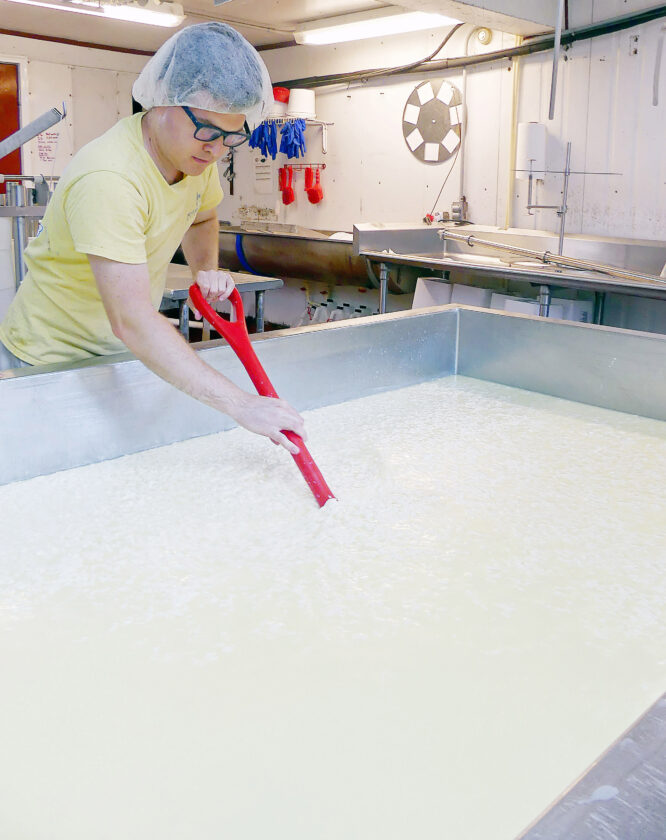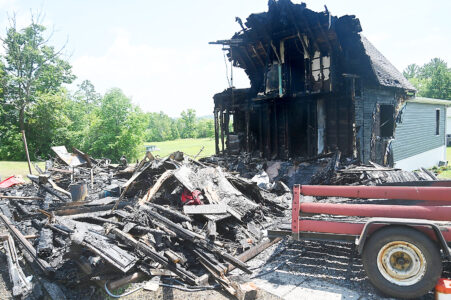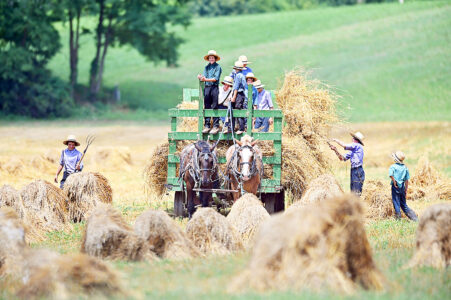Farm fresh: Local producers increase sales of raw milk, artisanal cheese
Local producers increase sales of raw milk, artisanal cheese

WILLIAMSBURG — An increasing number of farms across Central Pennsylvania have started bottling and selling raw milk in the past five years, and local farmers say the product is often more cost-efficient and tastes better to consumers.
While the trend seems to be a newer one for most producers, the Rice family, owners and operators of the Clover Creek Cheese Cellar, have been in the game since the early ’90s.
Located outside Williamsburg, visitors hoping to buy raw milk, artisanal farmstead cheeses or go on a cheese experience tour will need to turn off Clover Creek Road, drive up a tree-lined gravel driveway and across a small bridge to reach Clover Creek’s farm store. During the short drive, visitors might be greeted by that year’s calves in a pasture on the right or by Isaiah, the farm’s unofficial mascot, lounging in the shade.
Clover Creek has sold about 1,600 gallons of raw milk and produced about 10,000 pounds of cheese made from raw milk since the beginning of this year, according to Anthony Rice, cheese maker and second-generation farmer.
In Pennsylvania, it is legal for raw milk producers to sell in retail stores, but they must have mechanical bottling. Consumers are also able to bring their own containers for on-farm purchases.
The state Department of Health defines raw milk as “milk that has not undergone pasteurization to kill harmful germs, especially bacteria, or dairy products that are made from raw milk.” It also states that during pasteurization, raw milk is briefly heated to 161 degrees F for 15-20 seconds and then rapidly cooled, destroying “99.999% of any harmful bacteria that may contaminate raw milk.”
While the PA DOH writes that “the benefits of pasteurization far outweigh any possible nutritional harm,” local farmers usually disagree.
At Clover Creek and Hameau Farm in Belleville, there are numerous steps taken to ensure that its raw milk is as safe as possible to consume.
Rice said this includes keeping a closed herd, meaning they don’t buy cows, which reduces the risk of diseases that can spread from cow to cow. This is especially important in regards to the Avian Flu, which has affected cattle in nine states this year.
“All of the infected cows can be traced back to a farm in Texas,” Rice said. “The last time we bought outside cows was either 2000 or 2003.”
Audrey Gay Rodgers of Hameau Farm said there is “additional testing required with the licensure process — daily antibiotics testing, milk and water are tested regularly for bacterias and pathogens.”
For Clover Creek’s artisanal cheeses, all of the cheese must be aged for at least 60 days because by that point, they would be able to tell if the cheese was no good, Rice said. The first two batches of cheese also have to be tested. The longest-aged wheel of cheese in the Cellar has been there since 2014.
However, sales at Clover Creek have dipped from last year, when they had sold about 2,600 gallons of raw milk by May. Rice partially attributes this change to raising prices. Whereas a gallon of raw milk from Clover Creek cost $7 last year, it was raised to $9 in 2024 to keep up with operational costs.
Being able to set their own prices and not having to purchase expensive equipment such as a pasteurizer has enticed more farmers to start selling their own raw milk, according to Rice.
“We transitioned into fully pasture-based farming in the early ’90s,” Rice said. “We didn’t have to make the expense of buying a pasteurizer. So, we don’t pasteurize anything. We’re able to market it all and sell it all without pasteurizing anything.”
Mark Fisher of Fisher’s Country Store in Bedford said smaller dairies have better sales with raw milk.
“They have to have a good system in place and make sure inspectors are happy with it,” Fisher said. “It is a lot cheaper for farms to sell raw milk than trying to start their own dairy.”
Rice echoed this, saying it’s one way farmers can “do direct sales and operate a profitable farm.”
“The milk co-op — you can’t make money with those any more,” Rice said. “With raw milk, there are less processing costs and you can set your own prices essentially. For the milk co-op, they set the price and the farmer has to accept it.”
Hameau Farm began selling raw milk in 2019 when it obtained its license from the state Department of Agriculture, Rodgers said.
In deciding to obtain that license, Jessica Matthews, a dairy grazing apprentice at Hameau, learned that, on average, “it costs farmers approximately $18.73 to produce 100 pounds (or about 11.5 gallons) of milk” while “receiving only around $15.21 when they sold this same amount of milk.”
Matthews wrote in an article for the Pennsylvania Association for Sustainable Agriculture that “the numbers made sense” with raw milk.
“We could sell just three gallons of raw milk directly to consumers for five dollars per gallon and get about the same price for what we sell 11.6 gallons of milk for at the co-op,” Matthews wrote.
Fisher said local stores are learning that if a farm has been certified, has its licenses and has been inspected, they can distribute the farm’s raw milk.
The Country Store has sold raw milk since 2019, when its supplier, Curvin Rissler of New Enterprise, obtained his licenses and certifications to sell the product. Fisher said they used to pick up their orders but now there is so much demand that Rissler’s delivery truck has to make two runs to distribute its products throughout the county.
From Jan. 1 to June 27 of 2023, Fisher’s sold about 2,547 gallons or half gallons of raw milk. In that same time period in 2024, that number has risen to 3,519, Fisher wrote in an email.
“This equates to a year-to-date increase of 972 units, or 38%,” Fisher wrote. “In dollar amounts, sales are up 39%. We began selling raw milk in June of 2019. Since then, we have sold 20,588 units of raw milk.”
Distribution is also high, with demand in both Pittsburgh and Philadelphia, where Rice says most of the Cellar’s cheeses end up. They also have distributors in Claysburg, Gettysburg, Harrisburg and even Chicago.
Rice said he will meet people at drop sites in Altoona, Tyrone, Bellwood and East Freedom while also attending farmers markets in State College.
“In Philly, there’s a pizza shop that goes through eight or nine wheels a week,” Rice said. “We move a lot of cheese.”
That demonstrates another factor in the rising popularity of raw milk and dairy products in the area: a lot of people assert it tastes better than its pasteurized counterparts.
“The number one reason I think to drink raw milk is that it tastes great,” Fisher said. “It has a lot more cream; it is much more creamier than homogenized milk. A lot of people like it straight up for the taste.”
According to Rice, most pasteurized milk is standardized, with the dairies removing cream for other products, which takes its fat content down to 3.5% for whole milk.
The desire for a richer product is paired with more consumers wanting to know exactly where their food is coming from, said Rodgers.
“I feel strongly that raw milk is a superior product and wanted to have the option to sell to the community at large,” Rodgers said.
Rice agreed, saying that “most of the dairy safety issues” are caused by post-pasteurization mishandling of the milk.
“I know there are some concerns about the safety of it, but I’d rather them trust their local farmer than who knows where they get it from at the local store,” Rice said.
Mirror Staff Writer Rachel Foor is at 814-946-7458.





